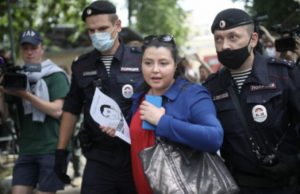London – There were at least 18 journalists among the more than 1300 journalists detained in Russia, where demonstrations were held in more than 40 cities against the call of the reserve forces to fight in the Ukrainian war declared by Russian President Vladimir Putin on September 21.
The International Federation of Journalists (IFJ), one of the organizations protesting the arrests, reported that most inmates wore identity vests and members of the press had badges.
Some of the arrested professionals were beaten on the street or subjected to inhumane conditions during detention, according to the editor of the newspaper Novaya Gazeta. At the same time, the government issued a statement warning the media to report protests using only official information.
Attack on journalists protesting Putin’s call
The human rights organization OVD-Info, which monitors legal threats and arbitrary arrests in Russia, reported that many journalists were subjected to physical violence while covering the demonstrations.
One of the parties, Denis Lipa, was beaten by the police when he showed his press card in Moscow, according to the records of the organization.
Another Artem Krieger, who was broadcasting live to the SOTA-Vision network, was arrested, charged with blocking traffic, and summoned to the military registry office.
Кореспонденту SOTA Артему Кригеру вменяют участие в несанкционированной акции. Его задержали прямо во время прямого включения со Старого Арбата. pic.twitter.com/PQThrmkBKU
— SOTA (@Sota_Vision) September 22, 2022
However, this Friday (23) morning, the Ministry of Defense said, “Russians working in organizations that guarantee the infrastructure of IT, information and communication, media, the national payment system and financial infrastructure.” He will not be called up for military service as part of the mobilization.”
Officially, Russian journalists don’t even have a workers’ organization to defend them. A week ago, the government received a court decision to dissolve the Journalists’ Union of the International Federation.
Also Read | In Putin government crackdown on media, Russian court extinguishes Union of Journalists
Even though the union organization was officially shut down, its general secretary, Andrei Jvirblis, opposed the violence when broadcasting the protests with the Putin government’s call for reservists.
“This is not the first time we have witnessed the police treating journalists covering the protests as protesters,” he said.
Jvirblis said that in some cases this could be explained by the lack of information of the police, who did not clearly identify the press representatives, “But this time the desire of the authorities to suppress any information about the protests against the policy is clear. ”:
“A society without channels of knowledge is like an organism with atrophied pain reflexes. Such a situation is deadly dangerous.”
IFJ President Dominique Pradalie described the wave of arrests as “utterly shocking and another blatant attempt to silence the truth”.
Arrested journalist goes to prison
According to OVD-Info, detainees are held in inhumane conditions. Some remained in rice wagons, others in insect cells.
One of the victims, St. Serafim Romanov, editor-in-chief of Novaya Gazeta in St. Petersburg, made a statement via Telegram about the detention conditions of the protesters and the psychological torture they were subjected to.
The newspaper founded by 2021 Nobel Peace Prize winner Dmitry Muratov has lost the media record, but many professionals continue to try to inform the public through social media.
The editor was sentenced to five days in prison, accused of “violating the procedure for filing a civil action”.
Romanov reported that the prisoners were “carried away like firewood” for more than a day.
“We were detained [no dia 21] around 9pm and we spent the night in the police department. There were 50 people in a room where there was no place to sleep. Food and water were brought by volunteers.
All night people were asked to fill out questionnaires, follow protocols, take pictures and fingerprints. After midnight we were finally taken to the Kalinin District Court, which was a three hour bus ride.
While everyone was summoned to the hearing with the judge one by one, the convicted were imprisoned without food or water, as parcel delivery was not allowed.
So they started taking pictures again and following the protocols. So another six hours passed.”
At the time of writing, Romanov said he was sitting in a stopped bus that was supposed to take them to a detention center.
“As a result, 30 people didn’t sleep for more than a day and didn’t eat properly, some got really sick. Of course they are deliberately making fun of us.”
Official speech about the protests
In addition to arresting and intimidating journalists, the Vladimir Putin regime is trying to control narratives of protests against the call for war.
The Russian media control body, in a statement to “press and other information sources” posted on its website, threatens those who publish content that does not conform to the official versions.
The text says:
Roskomnadzor advises on the need to use only information and data obtained from federal and regional executive bodies when preparing and publishing materials on mobilization activities in the territory of the Russian Federation.
Media editors are required to establish their credibility before publishing material in accordance with Article 49 of the Media Act.
The regulatory body states that “the dissemination of false information is subject to Article 13.15 of the Code of Administrative Offenses of the Russian Federation. He warns about penalties by stating that it requires responsibility in accordance with the Article.
15.3 of the Federal Law “On Information, Information Technologies and Information Protection” No. 149-FZ “Dissemination of false information on the Internet. It means immediate ban pursuant to Art.
Also Read | Young fashion blogger using Instagram faces 6 years in prison in Russia
source: Noticias

